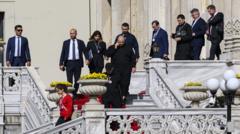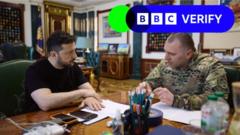Operation Spider's Web emphasizes Ukraine's capabilities while challenging perceptions of its position in the ongoing conflict.
Ukraine's Bold Drone Assault: A Defining Message to Russia and the West

Ukraine's Bold Drone Assault: A Defining Message to Russia and the West
Kyiv's recent drone operation against Russian airbases showcases its military ingenuity and resilience.
In an unprecedented display of military prowess, Ukraine has launched a sweeping drone attack on Russian airbases, marking a significant chapter in its ongoing conflict with Russia. Dubbed "Operation Spider's Web," the assault has generated significant buzz not just for its ambitious scale, but also for the critical messages it sends to both the Kremlin and Ukraine's western allies.
Reports from the Ukrainian government suggest that the operation inflicted what they estimate to be around $7 billion (£5.2 billion) in damages. While the full extent of the assaults on key aircraft remains unclear, defense analysts emphasize that the operation represents a substantial strategic victory. The Ukrainian Security Service (SBU) reveals that months of planning went into this coordinated attack, involving small drones transported via freight trucks to multiple launch locations across vast distances.
Defense analyst Serhii Kuzan asserted during a Ukrainian TV broadcast that the operation showcases unprecedented intelligence capabilities, allowing them to strike at the heart of Russian strategic bombers, specifically targeting 40 out of just 120 available. Despite the uncertain assessment of the damage, Ukrainian military blogger Oleksandr Kovalenko highlights the long-term implications. He notes that the advanced bombers targeted, including the Tu-95 and Tu-160, are not only rare but also difficult to repair and impossible to replace, suggesting a serious hit to Russia's military capabilities.
The effectiveness of Operation Spider's Web goes beyond material loss; it serves as a powerful statement of resilience to both Russia and Western powers. Many officials in Ukraine express concern that Western nations, particularly the United States, perceive Ukraine as nearing defeat. This incident challenges such assumptions, illustrating that Ukraine has the means and will to continue the fight.
Svyatoslav Khomenko, a journalist based in Kyiv, relays sentiments from officials stressing the frustration that Ukraine may still be underestimated by its allies. In a poignant Twitter exchange, Ukrainian defense journalist Illia Ponomarenko contrasted the strike's ramifications to past narratives that suggested Ukraine had limited options left. The commentary circulated in Ukrainian media indicates a renewed sense of determination amongst leaders and citizens alike.
As Kyiv sends representatives to Istanbul for ceasefire discussions with the Kremlin, the impact of Operation Spider's Web looms large, reiterating that Ukraine remains a formidable player in the conflict and pushing back against narratives of impending surrender. Whether it alters perceptions in the West remains to be seen, but for the moment, it demonstrates that Ukraine’s spirit and resolve are far from diminished.
Reports from the Ukrainian government suggest that the operation inflicted what they estimate to be around $7 billion (£5.2 billion) in damages. While the full extent of the assaults on key aircraft remains unclear, defense analysts emphasize that the operation represents a substantial strategic victory. The Ukrainian Security Service (SBU) reveals that months of planning went into this coordinated attack, involving small drones transported via freight trucks to multiple launch locations across vast distances.
Defense analyst Serhii Kuzan asserted during a Ukrainian TV broadcast that the operation showcases unprecedented intelligence capabilities, allowing them to strike at the heart of Russian strategic bombers, specifically targeting 40 out of just 120 available. Despite the uncertain assessment of the damage, Ukrainian military blogger Oleksandr Kovalenko highlights the long-term implications. He notes that the advanced bombers targeted, including the Tu-95 and Tu-160, are not only rare but also difficult to repair and impossible to replace, suggesting a serious hit to Russia's military capabilities.
The effectiveness of Operation Spider's Web goes beyond material loss; it serves as a powerful statement of resilience to both Russia and Western powers. Many officials in Ukraine express concern that Western nations, particularly the United States, perceive Ukraine as nearing defeat. This incident challenges such assumptions, illustrating that Ukraine has the means and will to continue the fight.
Svyatoslav Khomenko, a journalist based in Kyiv, relays sentiments from officials stressing the frustration that Ukraine may still be underestimated by its allies. In a poignant Twitter exchange, Ukrainian defense journalist Illia Ponomarenko contrasted the strike's ramifications to past narratives that suggested Ukraine had limited options left. The commentary circulated in Ukrainian media indicates a renewed sense of determination amongst leaders and citizens alike.
As Kyiv sends representatives to Istanbul for ceasefire discussions with the Kremlin, the impact of Operation Spider's Web looms large, reiterating that Ukraine remains a formidable player in the conflict and pushing back against narratives of impending surrender. Whether it alters perceptions in the West remains to be seen, but for the moment, it demonstrates that Ukraine’s spirit and resolve are far from diminished.




















